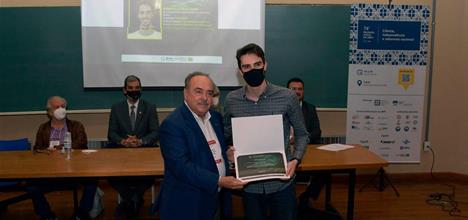Professor Paolo Rech, from the University of Trento (Italy) and the Universidade Federal do Rio Grande do Sul (Brazil), is a regular user of the ChipIr beamline at ISIS, using it to test electronic chips for their resilience to cosmic radiation. He was awarded an ISIS Impact award in 2020, and his group's winning success has continued.
It was recently announced that a paper published in collaboration with the ChipIr team received the 2022 Best Paper Award from the IEEE Nuclear and Plasma Sciences Society. The study, "Selective Hardening for Neural Networks in FPGAs" was published in the IEEE Transactions on Nuclear Science in 2019. As well as ISIS, the research was carried out in collaboration with the Universidade Federal do Rio Grande do Sul in Brazil and Brigham Young University in the United States.
.jpg)
Professor Paolo Rech on the ChipIr beamline with Chris Frost.
The study shows how it is possible to increase the reliability of neural networks, a promising solution for automatizing vehicles in the automotive, military, and aerospace markets, by using programmable circuits such as Field-Programmable Gate-Arrays (FPGAs). These are inexpensive, flexible, and have low power consumption. Nevertheless, they are also known to be susceptible to radiation-induced errors. Professor Rech and his colleagues used experiments on ChipIr to identify the most critical parts of the circuit and harden them, without the need for expensive or unnecessary modifications.
In addition to the paper's success, the collaboration has also seen multiple achievements through the work of the students involved. Fernando Fernandes dos Santos, supervised by Professor Rech and Professor Luigi Carro, was awarded the best PhD dissertation in computer science for the whole of Brazil. His thesis included the results of many experiments using the ChipIr beamline, including one done remotely during the Covid-19 lockdown period.
“It was unexpected, as my topic is very different to others in the computer science discipline," said Fernando. “But maybe this is what caught their attention? The judges liked that there was a practical experimental side to the work." Fernando will collect his award in December, when three overall winners will be chosen from the subject area winners.

Dr Fernando Fernandes in the ChipIr cabin.
Professor Rech added: “The collaboration with the team at ChipIr has played a significant role in his work and we're harvesting some good results!"
Another of Professor Rech's students, Rubens Luiz Rech Junior, has received the award for the best undergraduate research of Brazil, despite having to translate his application from English to Portuguese the day before the deadline! He was called by the Brazil research funding agency president in person and received the award in person earlier in the year.


Rubens Luiz Rech Junior, receiving his award for the best undergraduate scientific research work of Brazil.
“We designed ChipIr as a state-of-the-art irradiation facility to address reliability issues caused by cosmic rays in key technological area like driverless cars," says beamline scientist Dr Chris Frost. “Seeing our collaborator Paolo and his students, Fernando and Ruben, getting recognition for just such work is very satisfying and deeply rewarding for the whole ChipIr team."
